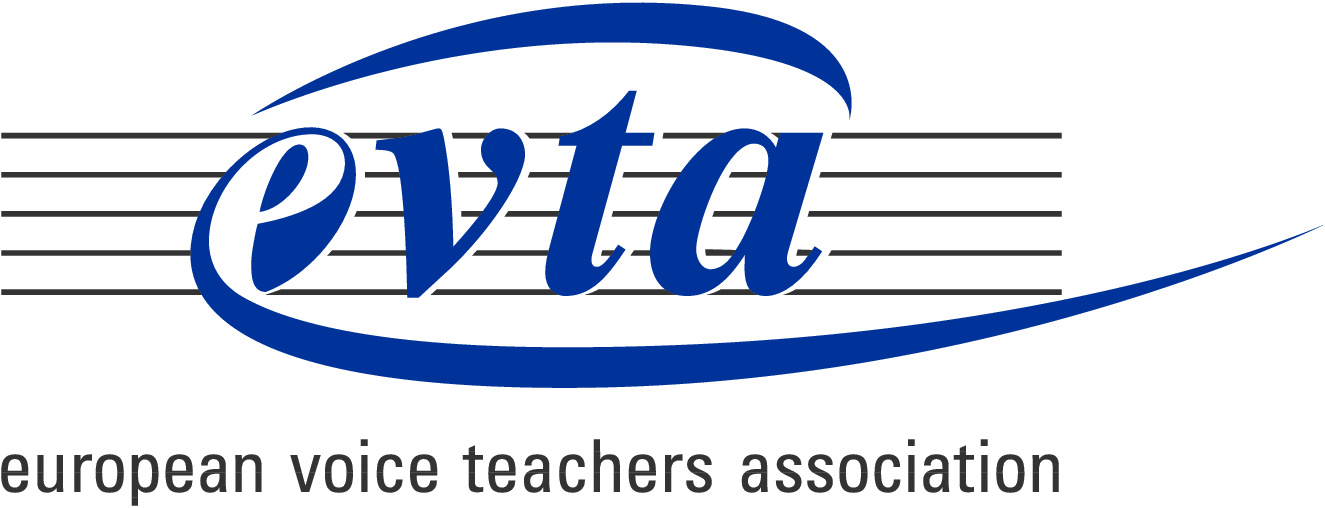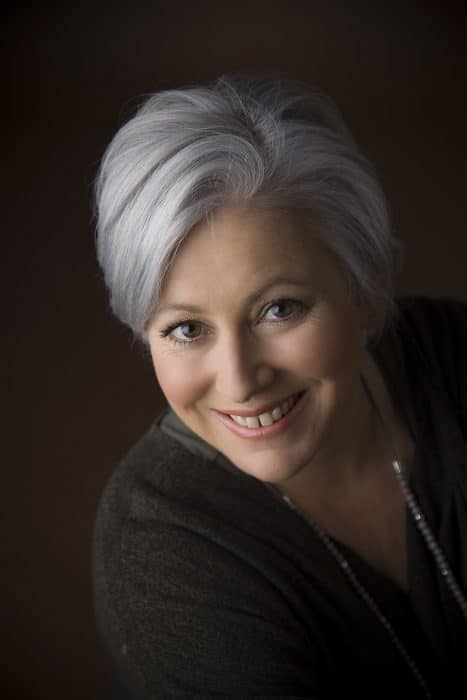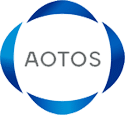Newsletter articles
January 2024
Spotlight on new members: Meet two of our new members who are making big waves in Manchester's youth theatre scene.
Welcome to AOTOS, Kimberly and Dave! We are so pleased to have you as part of our organisation. You are a husband and wife team who run Manchester Musical Youth (MMY).
Is MMY the thing that put you both on the path to becoming singing teachers, or were you already teaching?
We were both secondary school music teachers and had put on productions in school, which I suppose inspired our passion for Musical Theatre. Once we set up MMY I think I particularly became very aware that although I was highly trained musically, I didn’t know technically how to develop voice techniques and that’s when I reached out to Vocal Process and began my training with Dr Gillyanne Kayes and Jeremy Fisher. The first course I attended with them (Inside the Singing Voice) blew my mind and gave me a thirst to learn more. I completed several more courses, many during lockdown and then completed the accreditation programme.
As I developed my awareness of singing technique, I was approached by students from MMY who wanted singing lessons and once I started (and got great results) more and more students came. Dave saw how much I was learning on the courses and signed up as well, although he was already trained as a singer at university. You can never stop on this learning journey, and he now is also a thriving singing teacher. We have a singing practice called Vocalise Academy for Young Voices, the Vocalise part being a nod to Vocal Process as they helped us so much to develop. We are very proud of our students who have all had 100% distinction pass rate in exams, gain places at some of the leading drama schools and regularly get leading roles in the shows we prepare them for.
What do you love most about teaching singing?
The reaction of the children when they can achieve something they couldn’t before. We both have a great toolbox of exercises and tasks the children can try out in order to develop their voices, and we both love to experiment with straws and other ideas. There is such a connection with a singing student, and we hold two concerts a year where our students perform and it’s always lovely getting feedback from their family and friends who can see the improvements they have made every six months.
What advice would you offer to teachers working with young singers interested in getting involved with musical theatre groups?
Keep reading
Keep training. Nobody ever knows everything, and it is so good to always look to improve. Find your ‘tribe’ of people who can support you if you’re looking for repertoire or advice on a voice problem. Help them to find a good theatre company that will develop their singing, dancing and acting. There are some good review sites, such as North West End and of course NODA also reviews many youth productions. Do your research and contact the companies to see if they are the right fit for you. We will always allow potential new members to come and sit in on a rehearsal if they are unsure so that they can get a feel for us; it’s important that you are happy if you’re going to be spending so much time there. Prepare students not just for the audition but the aftermath of an audition. As singing teachers we are often more than just a student’s voice guru, we are acting coaches and mentors. Understanding the qualities of a performer, managing expectations and dealing with rejection by building resilience are all part and parcel of the work we do in the voice studio.
What made you decide to take the plunge and join AOTOS?
We have seen the AOTOS community growing and know many colleagues and friends that are members, but talking to you [Louisa] before Christmas made us see that there were lots of benefits such as the courses and networking, so we both took the plunge.
Are there any AOTOS events that you are looking forward to this year?
We are looking forward to exploring the range of courses open to us, both in the North and online. We would also like to meet up with colleagues from further afield, so the National conferences are very appealing too.
Where can people find out more about you?
Our website is currently being reconstructed but follow us on our social media: @mancsmy
Our next show is ‘Les Miserables School Edition’ in July 2024 at our home, Z-arts. https://www.z-arts.org/events/les-miserables-school-edition/
Our next MMY Apprentices (our 8-13 year old group) show is ‘Annie Jr’ and we are currently taking on new members for this show. Contact info@manchestermusicalyouth.co.uk for more details.
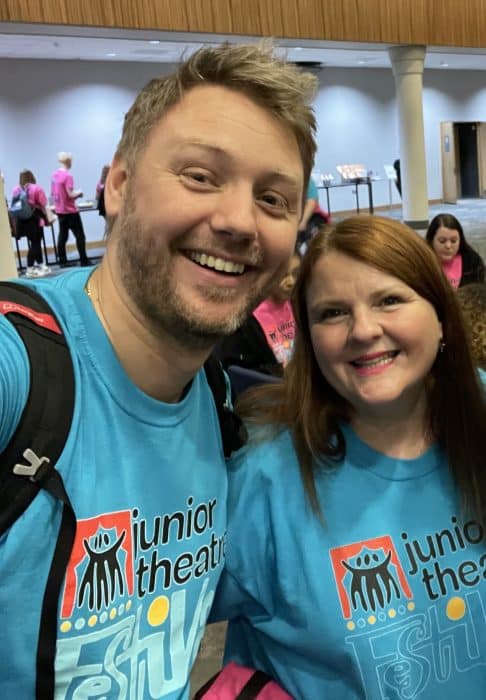
‘All’s Well That Ends Well’: Entering Singers for the New LCME Musical Theatre Examinations
by Janice V Thompson
I feel a certain loyalty to the London College of Music exams as, in my capacity as Director of the JTPTrust, a Wiltshire based vocal educational charity, I have been entering singers for Music Theatre Grades and Steps for almost three decades. These exams have always been a breath of fresh air, the advanced grades ideal for BTEC and Performing Arts students and the lower grades offering young singers a unique opportunity to combine character, song, dance, and movement. So, when the new LCME Musical Theatre Syllabus came into being in October 2023, despite certain misgivings, I was determined to make sense of the new syllabus. The simplest way of understanding what was required, I reasoned, was to enter candidates for these exams, beginning with the lower Grades and Steps and accompanying the singers myself so I could gain first-hand experience alongside our young performers.
Exam-wise, this new Musical Theatre syllabus offers three choice types for each Grade:
· Recital, consisting of a performance and viva voce discussion.
· Concert, consisting of performance plus an examiner’s reflection.
· Cabaret, a Leisure-Play examination offering opportunity for an extra song in place of either the discussion or performance.
· Steps 1 & 2 (pre-grade 1 exams) are still in existence, although, (as I discovered after the exams), simply have the Recital option.
The LCME Board has produced set music Handbooks for all the Grades. Some of the material in the Steps 1 & 2, and Grades 1 – 4 is challenging; however, I concluded that there was enough variety of material in the books to find something possible for each Grade.
Keep reading
Navigating the new syllabus was somewhat time-consuming. Consequently, the shape of our 10 young performers’ exams evolved organically throughout the term, thanks to the patience and flexibility of my Team Teachers and parents, plus several clarification emails between myself and the LCME Board. We opted to enter the Concert versions of the exams, since preparing a detailed programme AND a viva voce would have exceeded our available class time. Thankfully, it seemed that we had prepared what the examiners had been expecting. The mark sheets and results looked very similar to former exams, with our young singers achieving their expected Merits and Distinctions in Steps 1 & 2, and Grades 1, 3 and 4 exams.
Now reflecting, I have concluded that the main differences between the new and the old syllabi are:
· The new exams are named Musical Theatre (it’s easy to make a mistake on ERIC).
· The addition of a set piece with a compulsory spoken lyric, both individually marked.
· Spoken introductions for all the Grades.
· The presentation of a lyric sheet (I confirmed with the Chief Examiner that this can be entirely typed).
· The presentation of a programme and programme notes.
· The examiner should be also offered copies of own choice music.
Preparation-wise, our main concern was the new spoken lyric. This new exam element initially dominated lessons and we were fortunate to have former JTPTrust member and RBCMD graduate singer Matilda Wale (Tilly) available to work with the singers on this aspect. The general continuity between announcing, speaking, and singing was also demanding for the younger singers. To address this, Tilly and I eventually scripted and audio-recorded whole exams for the singers to learn. Our Grade 1 example of this format is below:
· Enter room with accessories and props (eg Snowman toy and Peter Pan hat)
· Present examiner with programme and lyric sheet
· Say your name and announce your Own Choice piece (e.g., Walking in the Air)
· Sing your Own Choice piece (e.g., Walking in the Air)
· Introduce your set Handbook piece (I gotta crow)
· Perform the spoken lyrics of handbook piece with facial expression and hand gestures (I gotta Crow)
· Perform your set Handbook piece with gesture and characterisation
· Leave room and the examiner writes their reflections
Preparing detailed programme notes also caused concern, and it seemed to me that in the lower grades, we were training the parents rather than the singers! It was a relief when the Board published programme templates, which I and Tilly adapted and the singers (probably the parents!) re-adjusted for themselves, adding their own observations of the songs.
Ironically, it was the Step exams which caused the most confusion. The Handbook nursery rhymes set for these pre-grade 1 exams not only included spoken interjections within the songs but accompaniments of flowing broken chords and occasional unexpected dissonances. These settings sounded beautiful when demonstrated by my graduate teacher, but in their original forms were generally too demanding for our 5-year-old singers. However, following further contact with the Board, I felt able to improvise on what was set, reduced the spoken words to one single line and supported the little singers with quite simplified forms of the accompaniments. The examiners seemed quite happy with what we presented, although I am not certain how teachers using backing-tracks would resolve issues at this level.
My conclusion, based solely on my initial experience of these new exams, is that, although the new elements of the syllabus may appear daunting, the LCME Board was always helpful in resolving issues and the examination itself felt very little different to previous exams. I was glad that the JTPTrust had opted for the Concert exam version, with its examiners’ written reflection in preference to a viva voce. I noticed that our singers’ programmes went unmentioned on the report sheets and our results resembled previous exams. Gradually, the JTPTrust plans to also tackle the upper Grades and I hope these reflections will encourage other teachers to try out the new syllabus!
Good luck!
In January 2024 LCM have announced that new pathways will be coming in the Spring, so please keep an eye on their website for more updates.
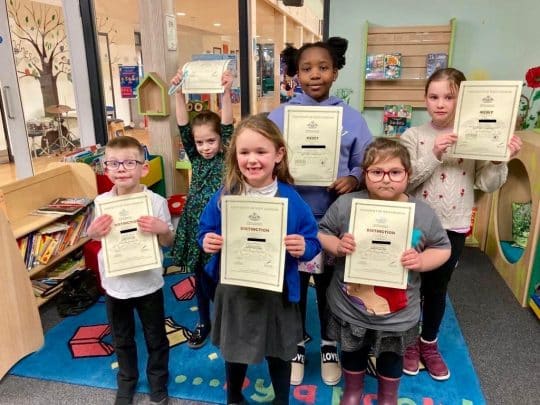
November 2023
Review of AOTOS Zoom event 'Osteopathy for Voice' with Chloe Spencer
by Elaine McKrill
Hosted by our own Chair Elect, Pamela Hay, this was a very stimulating and informative presentation. Chloe has had a fascinating, though circuitous route to becoming a registered Osteopath, having previously followed a varied career path through music, archaeology, forensics, TV, and finance! She is also a singing teacher which gives her a unique perspective on the nitty gritty of Osteopathy for Voice.
Her approach to presenting the subject matter is based heavily on her actual hands-on experience. This, coupled with Chloe’s relaxed and charming delivery, and clear supporting slides, made it very easy to understand the points made.
Chloe reminded us that one of the fundamental principles of Osteopathy is that it takes an holistic view of the body, so that if everything is working in harmony, the body will be healthy. Consequently, if issues are manifesting themselves through the voice, there may well be other factors to be considered elsewhere in the body. Essentially, osteopaths treat the body by giving it the opportunity to heal itself, so despite the public perception that it’s all about cracking and clicking, treatment is entirely bespoke and unique to each individual.
In her practice, Chloe deals mostly with Functional Voice Disorders, noting that other disorders such as vocal illness, nodules, swellings, and cancers would be, in the first instance, more the territory of ENT specialists and speech and language therapists. In particular, she does a lot of work around Muscle Tension Dysphonia, which is most frequently based on breathing.
‘Meeting in the Middle’ took us through the three main types of help available for those with vocal issues, which gave a useful overview and point of reference: 1. Speech and language therapists, ENT specialists and Voice Clinics tend to be the first point of referral, can be NHS or private and will provide vocal and breathing exercises; 2. Osteopathy and Physiotherapy can be accessed via an NHS Voice Clinic or privately and tends to be provided by sole practitioners or those working within specialist clinics and 3. Combined Therapies. These include manual therapy, vocal massage, breath work, SLT exercises and psychological interventions. The combined therapy route can be more effective and is often the best route, but it ultimately depends on the needs of each individual.
Keep reading
Chloe described ‘Direct techniques’ which include osteopathic manipulation, vocal massage, Laryngeal Manipulative Therapy LMT and diaphragm techniques (posture; how does the voice sit in the frame?) and ‘Indirect techniques’ consisting of Cranial osteopathy, breath work (including the Accent and Buteyko methods) and the incorporation of vocal technique. She explained that learned experience clearly shows that breathing is fundamental, not least of all the action of breathing OUT, and her passion for this shone through. These days it is usual to incorporate vocal techniques during treatment rather than the old school method of treating passively.
We know that in modern society Stress affects us all to one extent or another. Chloe reminds us that singing is said to be good for your mental health – and it is – until you use it professionally, which we all know can bring its own stresses! For the majority of people, the voice seems to be the focal point for stress.
Chloe’s advice for our own teaching was to Stop, Look and Listen. We all agreed that it is crucial to watch our students and learn to spot signs of problems, perhaps even before they do. We should listen carefully, to what they are telling us about their broader lives as well as their singing and then we need to be equipped with the right advice to help them (knowledge of local practitioners, routes for funding etc). BAPAM (British Association for Performing Arts Medicine) is a highly recommended resource as well as NHS and Private Voice Clinics (BVA) and OPACA (Osteopathic Performing Arts Care Association).
This concluded the main presentation and then Chloe was able to return to points raised in the chat.
We bemoaned the difficulty, even for professional voice users, to get GP appointments so it’s good to know that there are potentially lots of other routes to find help, once you know where to look.
We agreed that any form of mindful breathing is a valuable tool for destressing, be it box breathing, the Buteyko method (originally a Russian technique), mini pauses – just consciously thinking about breathing. Chloe recommends James Nestor’s book Breath, notwithstanding the fact that somehow, he failed to talk to a singer in his research and he also isn’t a fan of osteopathy!
The subject of Hypermobility was touched upon several times and Chloe now went into more detail. She and others on the call even demonstrated examples of their own hypermobility! It is a connective tissue disorder and there is a spectrum or scale of severity. In answer to the question of whether it is a good idea to talk about hypermobility with a young singer, Chloe suggested that for a severe case affecting the tongue, a recommendation to a speech and language therapist would be advisable but believes that in less severe cases for example in young adults, Pilates can be incredibly helpful, building strength gradually. Ultimately, a specialist diagnosis is always recommended with a rheumatologist via the GP.
This was an insightful and stimulating session, bringing us up to date with current thinking in this important area and confirming without any doubt that osteopaths are valuable Registered Health Professionals who offer complimentary alternative medicine with proven results.
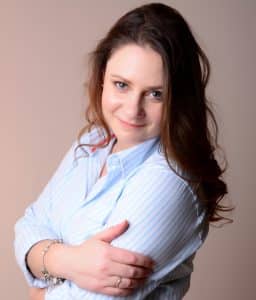
Spotlight on a member: Interview with Kate Cubley
Kate Cubley is a voice and breath specialist, PhD researcher, singer, singing teacher, MD and choir director. I wanted to chat to her about her recent deep dive into breathing and her interest in the Buteyko breathing technique.
Louisa: Could you tell me a little bit about how your interest in Buteyko breathing came about?
Kate: It will probably surprise you to hear that this stems as far back as 2021 when one of my singing students recommended the book Breath by James Nestor. It was this book that really piqued my interest in hacking the nervous system through the way we breathe and changing our habitual breathing to improve our health. Unsurprisingly, it was whilst teaching breathing in that specific singing lesson that prompted the book recommendation. I’ve always taught breathing in my voice lessons as I find voice and breath so inextricably linked – they’re both completely fascinating to me as well, which is useful!
The way I teach breathing for singing now is very different to how I did two years ago: I’m much more deliberate about the breathing I do with each student and recognise the benefits beyond just being a foundation for the voice. I also link the strategies I choose for each person directly to their needs, their voice, their health or their performance, so it’s very individualised.
Anyway, fast forward a year after reading James’ book and I’m in Stockholm at the Conscious Breathing conference hosted by Anders Ohlsson and everyone I met there seemed to have trained in Buteyko Breathing Technique (BBT) with Patrick McKeown. I knew even then, during the conversations with these breathwork facilitators, that I needed to train with Patrick.
Keep reading
After speaking to several Buteyko instructors about their experience, I signed up and then qualified as a BBT instructor earlier this year. If you’re looking for research based breathing practices, then definitely start with Buteyko.
Louisa: What are the benefits?
Kate: There are many benefits to Buteyko, including increasing the uptake of nasal nitric oxide in the body, which promotes better health. Buteyko can be used to improve dysfunctional breathing, sleep disordered breathing, insomnia, anxiety and panic disorder and respiratory conditions such as asthma.
Louisa: How do you connect this type of breathing with singing and how might it be beneficial for singing teachers?
Kate: If you consider the singer in relation to the benefits listed a moment ago, there are several reasons Buteyko could prove useful to vocalists, not least: learning to breathe better! My personal experience is linked to coping with anxiety, but different people experience different benefits, because we’re all individuals and have different needs. One of the key facets of Buteyko is breathing through the nose, which you’ve probably seen in the media with sports personalities or celebrities taping their mouths closed! There are many benefits, but for singers, nose breathing can help reduce vocal effort and improve cognitive function. I recognise that it isn’t always practical during song, but nasal breathing is certainly a useful habit to form outside of the singing classroom. There is also a Buteyko exercise called ‘Decongest the Nose’ which is especially useful around this time of year.
My clients often surprise me with their own individual reasons for joining the Buteyko sessions, because they’re not always the reasons I might first imagine! What is eternally important for us singing teachers to remember is that the singer in front of us may be dealing with all sorts of stuff that doesn’t necessarily (need to!) creep into the singing classroom. Whilst I actively and openly promote the benefits of Buteyko for singers, in voice lessons or group rehearsals I only tend to lean into building awareness during warm-ups, rather than engaging with the full Buteyko exercises. The students who want more sign up for Buteyko classes in addition to their singing lessons. Certainly, teaching breathing to enhance singing and performance is enhanced by understanding how to breathe – but singers don’t always have to breathe well to produce a stellar performance – what may be classed as dysfunctional breathing may be the exact tool required to enhance a character portrayal, or give a voice its unique quality, for example. It’s handy to always keep play and curiosity in mind.
Louisa: Are there any drawbacks or people this may not be suitable for?
Kate: As with any kind of breathwork exercise, there are contraindications. Buteyko incorporates breath holding and experiencing air hunger. Some of the exercises should be avoided by people with anxiety or panic, high or low blood pressure, asthma or shortness of breath, cardiovascular issues and during pregnancy. There are Buteyko exercises and lessons these populations can engage with, but it’s worth working with a qualified instructor so they can create a suitable programme for your needs.
Louisa: Where can people learn more?
Kate: I’m running a workshop for Voice Study Centre in January 2024: www.voicestudycentre.com
My next course Buteyko for Beginners will be held online in February 2024: www.talaperformance.com
If you are interested in becoming a Buteyko instructor: www.buteykoclinic.com
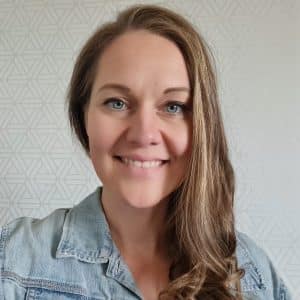
September 2023
Interview with Dr Kari Ragan
On the 18th August, I had the pleasure of speaking with Dr Kari Ragan, who is a voice teacher, a published author, and a singing voice specialist. Please note that this is a shortened, edited version for the purposes of the newsletter. A full version will be published in the Annual Review.
Louisa: Thank you so much for speaking with me today. Can you tell us a bit about your background as a singing teacher and singing voice specialist.
Dr Ragan: I started out as a teacher; I think probably a lot like most people do. I had been involved in music since I was a child, singing in the choirs, and knew I wanted to be an opera singer. There was no other option for me when I was looking at universities. And off I went. I started out at a small liberal arts university before transferring to Indiana University, which here in the States is one of our preeminent voice training programmes. And I had a teacher - Barbara Poulshock - and she thought I'd be a good teacher and connected me to a local high school. And then when I transferred to Indiana, I immediately contacted the local high schools and started teaching; it was just what I thought I was going to do. Although I have to say, I never embraced that I was a voice teacher, because I was a singer. I was not going to be a teacher. So, I didn't join NATS until my mid 30s. Because I was so determined that I was a singer. And I think I didn't want to embrace being a teacher to that degree, because I thought it weakened my position.
So off I went and pursued the career and had lots of wonderful performing opportunities. And finally, embraced the teaching.
Keep reading
Joining NATS really changed my life and the trajectory of my teaching. And the more I embraced my teaching, the more life just changed. Discovering Voice Science answered lot of the questions I had as a young singer. One of the greatest ironies of my life was standing in the halls (I remember it vividly) at Indiana University. There was a conversation going on and somebody mentioned Richard Miller. And I remember saying “oh, that science guy?” The hubris of youth. And so off I went into teaching, and I've been doing it for 40 years now. And I think one of the things that positions me in a particularly unique way is that I taught as a young teacher for the first 20 years of my life. I've always taught about 35 plus hours a week to 40 hours a week. It was undergraduates, graduates, doctorates in addition to my private studio. Then professionals, emerging professionals, and then one of the great blessings of my life has been the working with singers with an injured voice.
I did the Wicklund certification. Dr. Karen Wicklund was huge in affirming that I could use the title SVS (Singing Voice Specialist). And in making sure that I had the training so that I didn't need to go back and become a speech and language pathologist. Because I was already working in conjunction with my team and had done a sufficient amount of study. And most importantly, I had already been teaching with non-disordered voices for a couple of decades.
Louisa: I saw your recent article, “Bridging the Gap: musical and pedagogical terms for voice care professionals”. What was it that inspired you to write the article?
Dr Ragan: Well, I have to say, Dr Lesley Childs, who's down in Texas, wrote to me and asked me. I have two things, if you don't mind, I want to say first of all. Please don't download the PDF of that for another few weeks because there were typos discovered that both I and a copy editor missed, and one really critical piece of information that was transposed. There are four mistakes that will be corrected. But the other funny thing is that as I was trying to write that (in a very crazy time this spring), I thought nobody's ever going to read this article. As I was writing it, I thought the doctors are never going to read this article. And so, I really debated, how deep do I go with the information? And then I was just so shocked a couple of weeks ago that it was shared. People seem to be responding to this article. The whole time I was writing it, I thought, I am putting so much energy into something that will not be read by one single person.
Louisa: I think so many of us really appreciated it because we have had clients who've had to go through the process of seeking medical help or medical support. And we find that there are so many roadblocks because there's miscommunication, or there's a difficulty in understanding, or perhaps we don't know how much we're able to communicate, or how much we should be able to communicate with the medical team. So, I think a lot of us are just really grateful for you for making that bridge.
Dr Ragan: Thank you for that. I think the answer to your question is, it depends on who the medical team is. We still have a lot of work to do in our profession, for people to understand. If your singer is in trouble, who do you send them to? This laryngology of the performing voice is a subspecialty within a very new subspecialty (new being 25 years). So, there are people that live in small towns that don't have access to a doctor with even the right equipment for the medical evaluation, the video stroboscopy. So, we have a lot of work to do for people to understand that it is critical. I have the privilege of going to these medical conferences with the SLP laryngologists who specialise in performing voice, and I love when they get case studies up there on the screen and the doctors sit and debate. The more you integrate with that aspect of our profession, the more you realise it's not black and white. And there's not always a clear line. That's important for us to know, as the voice teacher, to sit back and certainly not think that we have all the answers for everything. And most importantly, to continuously be in communication and collaboration with that medical team.
Louisa: How involved do you feel a singing teacher should be in that process of seeking medical support?
Dr Ragan: I think they absolutely should be involved in encouraging their students. I will start by saying it is not our job as voice teachers to guess. I say that all the time, and I see things on social media that make my heart hurt a little bit. Somebody will post, “my student is hoarse”, and then there's a thread of, “oh, it's reflux”, “oh, it's this”. Why would one speak with such authority of something so serious, when we aren't looking at the vocal folds, we don't have their medical history. We don't have their personal history, their vocal history. There's so much that goes into an evaluation from all three parts of the team. And, of course, then the team can get bigger. I work with a physical therapist who specialises in the performing voice. You can pull in a dentist; you can pull in a neurologist. So how involved is a voice teacher? I think that they need to be involved in encouraging students to get a baseline stroboscopy, even before they have trouble. You don't have to be a singing voice specialist to go with your student to the doctor's visit and be involved if the student is comfortable with that, and the medical team allows it. But that doesn't make you a singing voice specialist.
You can find Dr Kari Ragan’s website here: https://kariragan.com/
Her book, A Systematic Approach to the Voice, is available on Amazon or through Plural Publishing.
A Voice Teacher Practicum Certificate Online Course is available with Dr Ragan through Voice Study Centre on Mondays in October and November. Please find full details here: https://voicestudycentre.com/online-certificated-courses/voice-teacher-practicum-certificate-with-dr-kari-ragan/
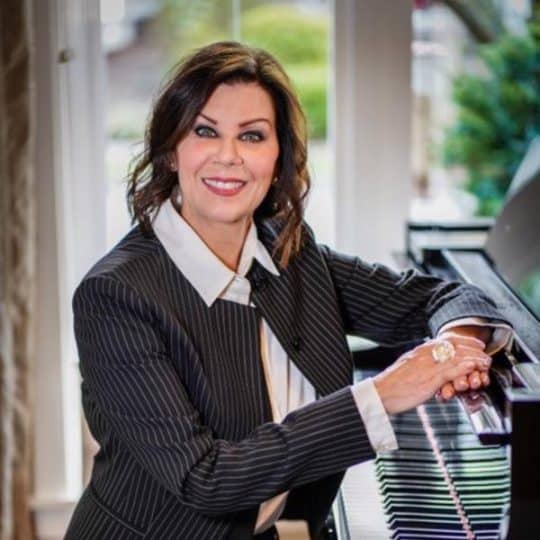
EVTA report
This year’s annual meeting of the European Voice Teachers’ Association (of which you are automatically a member as an AOTOS member), was held at Erlangen, Germany, in August, and attended by Nicki Kennedy, our international coordinator for EVTA. Edwin Pitt-Mansfield attended remotely.
After the usual legal business was concluded, the new President Elect was voted in. Current President Susan Yarnall-Monks (UK) steps down from her role at the end of 2024, and Ellen Pieterse from the Netherlands will become President starting from January 2025.
Much of the discussion of the day was around dates of interest for the next few years. The first of note is the Pan-European Voice Conference. This takes place in Santander from 4th–7th September 2024, and further information can be found at https://www.pevoc2024.com. Members are warmly encouraged to attend this conference which particularly invites members of the medical and scientific voice communities to participate. Increasingly over the years, singing teachers attending these conferences have grown in number, and the benefits of the ongoing conversations between medical, scientific and voice coaching communities are valued highly.
In 2025, from 30th July–2nd August, the International Congress of Voice Teachers, or ICVT will be held in Toronto. This is an important conference, however, it should be said that it will take place in the same summer as the AOTOS 50th Anniversary conference, so perhaps one to be considered should the budget stretch to two conferences in the same summer!
Finally, EVTA’s own conference, Eurovox, will take place on Thursday to Saturday 20th–22nd August 2026 in Lucerne, Switzerland. This conference is already in the planning stages, and Lucerne will be a wonderful location for a summer meeting. There are exciting plans around this event, so it’s definitely one to put in the diary! Evta is keen to know what the member associations would find interesting to include in a conference, and what would attract members to Switzerland, so do feel free to email me nicki.kennedy@aotos.org.uk if you have great ideas and thoughts!
Ellen, the new President Elect, spoke about funding opportunities coming from various sources, primarily European grants. These applications are to be centred round creating funding for travel and lodging to conferences and events, and separately, to help associations with their various missions to train teachers. Sadly since our exit from the European Union, we may find that these grants do not apply to British applicants, however, we are publishing the link here for anyone who may be interested to find out more. https://culture.ec.europa.eu/funding/cultureu-funding-guide/discover-funding-opportunities-for-the-cultural-and-creative-sectors
We were saddened that in order to comply with EVTA constitutional rules, Spain, Turkey and Ireland had to lose their seats at the organisation on the grounds of lack of engagement and contact over a period of time. But we hope to welcome them back in the future and in the meantime, we can encourage individuals from those nations to join as ‘Friends of EVTA’ until such time as their national associations are in a position to rejoin. In happier news, new member Montenegro was welcomed. Montenegro is forming a new singing teachers’ association. Finally we enjoyed conversations around serving our respective members and growing our memberships, and were keen to hear from Finland, Switzerland, Austria and Belgium, all of whom have made particular strides in these areas. All in all, this was a most productive weekend, with some animated and energetic conversations around all things singing. The in-person meeting provided a welcome and important relief from the sterile Covid times where Zoom was the ‘go-to’ medium for our communications.
Nicky Kennedy, August 2023
International Coordinator for EVTA
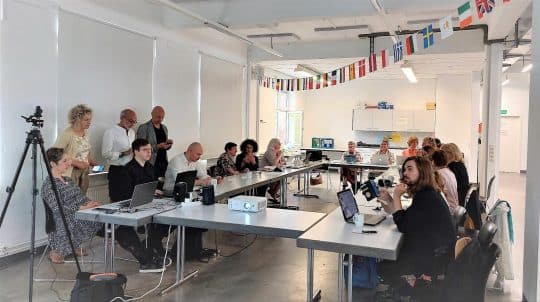
September 2022
EVTA report
Global Networking!
One of the few very positive outcomes of the Covid crisis has been the explosion of connections and networks across the globe, as Zoom and other platforms gave us the simplest of ways of engaging with our international colleagues. This blossoming of global networks online has continued in-person, as members of voice teaching organisations all over the world have begun to come together again at conferences and meetings, and the subject of global networks has dominated the conversation both at the EVTA Council meeting and at the ICVT conference this summer.
On 3rd August EVTA held their council meeting in-person in Vienna and on Zoom at the start of the ICVT Conference. AOTOS sent representatives to attend: Chair Edwin Pitt Mansfield in person, and Nicki Kennedy on Zoom. As well as the usual reports and elections, much discussion was had around developing and strengthening of ties in the world of singing teaching, in particular between EVTA, AOTOS and NATS in America, who are keenly reaching out to European and other International counterparts. On 23rd August NATS members set up a Zoom meeting with over 40 teachers from around the world, attended by EVTA and AOTOS representatives. Themes discussed included mentoring schemes, repertoire sharing, expanding the canon of literature, international masterclasses, connecting students internationally and sharing knowledge and resources.
Another EVTA initiative to be celebrated is the ‘Voice Care Corner’ (VCC) that EVTA have been running at various festivals, conferences and choral events. These have been successful and members of associations linked to EVTA were encouraged by Susan Yarnall Monks in her report to connect with EVTA if we wish to set up our own VCCs at local events, to help provide advice and care for healthy singing.
The ICVT conference in Vienna and the PEVOC conference in Tallin were attended by some AOTOS members, and we certainly encourage our members to engage with these programmes where possible as they are incredibly rich and valuable opportunities to meet the leading movers and shakers in the vocal pedagogy world. It is not always easy or affordable to travel to conferences, but connecting in these ways will be made easier than ever next June with a slightly earlier than usual AOTOS summer conference, organised alongside our colleagues at NATS, Global Connections! - The Wisdom Among Us, which will be held in London on 3rd and 4th June 2023 at the Voces 8 Centre. Save the date - more information coming very soon! We will be joined for this conference by EVTA members and also by our American colleagues at NATS during their UK pedagogy tour. It will be an unmissable opportunity to connect and chat with colleagues from around the globe, one for the diary!
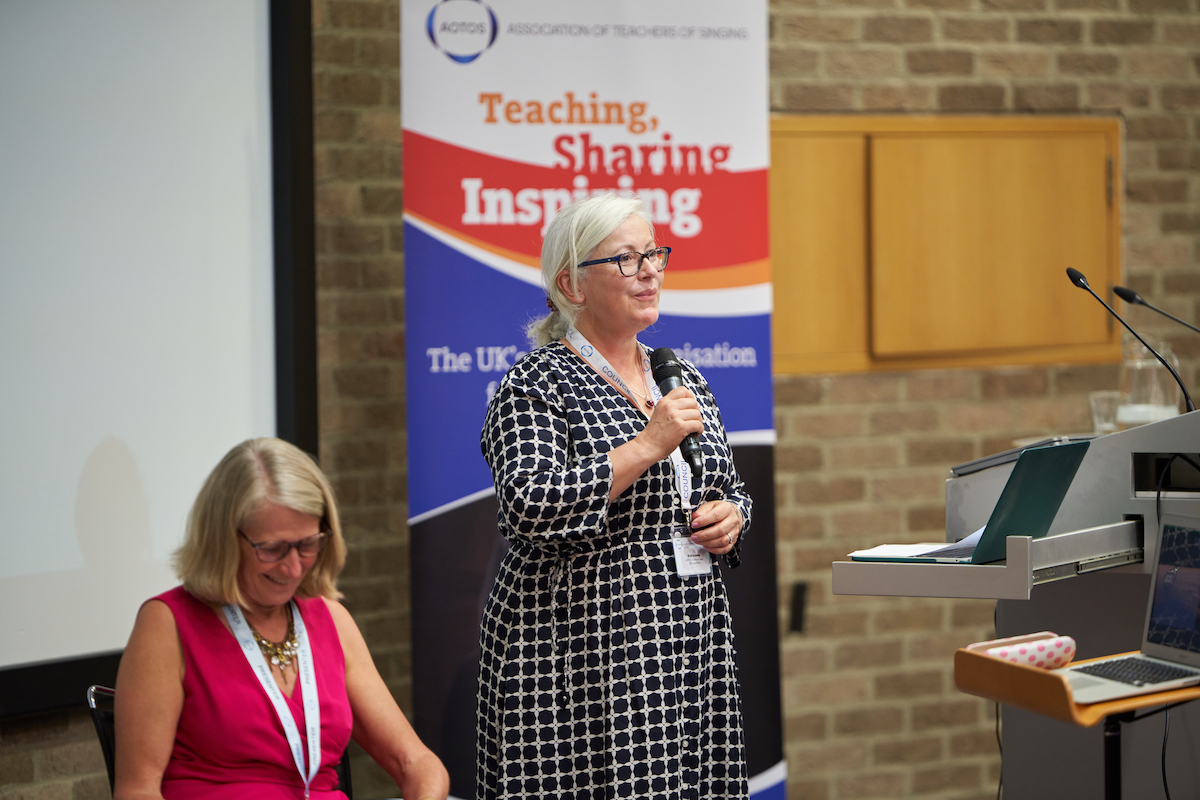
April 2022
Singing in Mandarin by Juliet Petrus
Nothing brings me as much joy as singing in Mandarin. My journey to a career in China began over a decade ago with the acceptance into the iSING! International Young Artist Festival, originally iSING! Beijing, bringing Western singers for a unique programme including not only lessons, coaching, and lectures with a world-class operatic faculty, but also intensive Mandarin language study during a five-week stay in China. The experience profoundly changed my life, setting my career on an unpredicted path of intense study, performing and teaching in China, ultimately leading me to become an advocate for the repertoire in the West and to co-write the book, Singing in Mandarin: A Guide to Chinese Lyric Diction and Vocal Repertoire (Rowman and Littlefield, 2020) with pianist, conductor and Dean of Tianjin Juilliard, Katherine Chu.
Most native English-speaking singers on the path toward a standard operatic or concert career have likely also sung in Italian, German and French. Beyond that, standard repertoire in performance halls worldwide often also extends to Latin, Russian, Czech and Spanish. But what of the language that represents over 1.4 billion native speakers worldwide? Why is Mandarin not yet a standard lyric language?
Those who have encountered Chinese as a written language will know that it does not employ the Roman alphabet; in fact, there is no alphabet at all. The written characters which may appear in two forms, simplified (Mainland China), and traditional form (Taiwan and Hong Kong), are pictographs with thousands of years of history. Each character represents a single syllable phoneme, and in its spoken form there are also one of four tones assigned to each syllable, although this is less important in its sung form. For singers not able to read the characters this is this the first hurdle but is by no means insurmountable. Various systems of transliteration exist, the one used in Mainland China being ‘pīnyīn.’ Pīnyīn assigns Roman letters to these phonemes, allowing a non-native speaker access to this pronunciation information. There are Chinese phonemes which are unfamiliar to the native English, Italian, French or German tongue, but no more difficult than sounds found in Russian or Czech. In fact, there is a fair amount of overlap between all these languages and Mandarin, a point emphasised in Singing in Mandarin.
As an educator, I am fortunate to have had over 25 years of experience working one-on-one and in masterclasses with students in UK, Europe, US and China. Through this, I have found that there is great value in having students first learn to sing in their native language. The novice singer expends so much energy on simply understanding the basics of posture, breath management, sound production, and tone that adding the articulation of new and foreign sounds may overload the ability of the singer, as well as the 30-60 minutes per week allotted to us as educators. Singing is profoundly engrained in Chinese culture, and as many Chinese-speaking students make their way abroad to study, one would hope that they would be encouraged to sing in their native language, not only for potentially helpful, pedagogical reasons, but for the cultural richness and diversity it creates within our studios.
After more than a decade of concerts, recitals, masterclasses and television appearances to sing in Mandarin in China, I am thoroughly convinced of music as the ‘international language’. We can begin to understand another country’s culture through their song, and when done so with authenticity and integrity, we foster a cross-cultural communication unmatched by any other form of diplomacy. My hope is that more teachers and students feel comfortable exploring the repertoire which invites them to reach across the globe, to sing in Mandarin.
– Juliet Petrus, April 2022
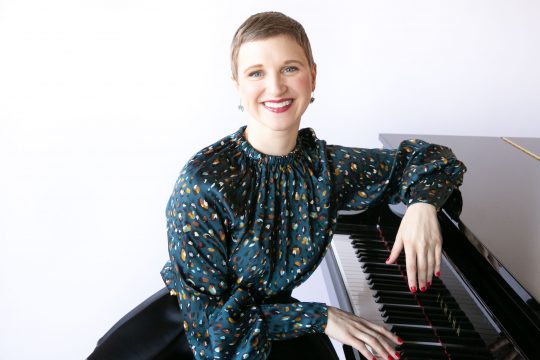
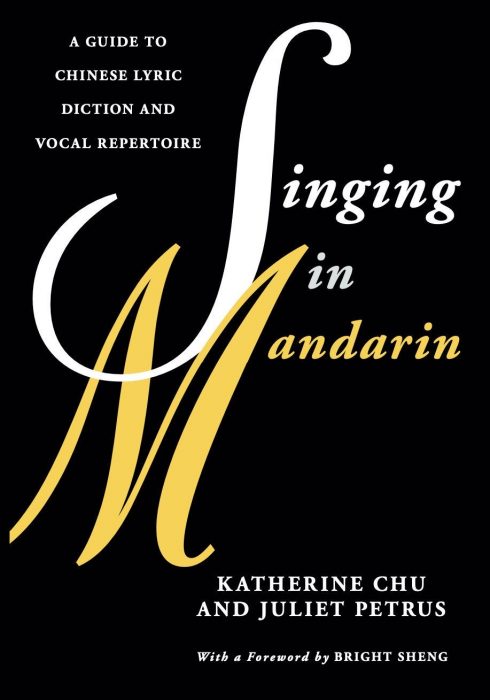
Report from the EDI committee
Equality, Diversity and Inclusivity is at the forefront of our thinking as we seek to improve how our organisation can better serve teachers from under-represented communities. We know only too well that we have a long way to go in these matters, but we are determined to actively work to improve what we offer.
Since the Autumn’s release of our Equality, Diversity and Inclusion mission statement, the EDI steering group has continued to meet and discuss this very important topic. We began by organising Unconscious Bias training for the whole Council, which was delivered in January by Fay Jennett from Tonic Theatre, an organisation that supports the arts and cultural sector to achieve greater equality, diversity, and inclusion. The thinking here was that we need to come together as a Council and explore and acknowledge our own bias, so that we can start to have this conversation with some shared understanding between us, a common starting point, if you will. Tonic Theatre are a great organisation with a real understanding of the arts community, and we would recommend them highly for this kind of essential work in any organisation.
Some of the discourse around EDI can be challenging as we take a hard look at our own practice, and as we come to better understand the areas that we need to improve what we do. We have noted that members can be unsure about asking questions on social media platforms for fear of ‘getting it wrong’, ending up in a heated discussion, or even being ‘shot down’ for using what is seen by some as inappropriate or undermining language. We came to the conclusion that members need to be able to be curious, ask open questions and raise subjects that can be discussed with compassion rather than judgement in a rapidly changing landscape. To this end we have organised a ‘Brave Space’ discussion to close our conference this summer. This is a forum designed to be a safe space to unpick some of the thorny issues around promotion of diversity, awareness and implementation of inclusive practice in the studio and actively promoting equality and broader representation. We have a panel of people who are invested in this conversation to lead the discussion, but we really want to hear from you, our members, and hope people feel able to bring their queries to the forum and engage in a discussion that is likely to raise more questions than it answers, but will hopefully be thought-provoking. We hope to cover all sorts of fascinating and thorny subjects, and imagine that the sorts of subjects that may crop up will range from working with neurodivergent students or students with impairments, learning difficulties or disabilities, to questions around gender, trans voice and opera roles, through to racism and repertoire choices, to programming composers from under-represented groups and the whole question of proactive promotion of diversity in a work culture. No doubt there will be many, many more subjects besides.
The steering group is now to be led by Rachel Sherry, and will continue to meet approximately three times a year. The focus of the committee is to provide a voice on Council when programming, and a voice that will speak when important decisions are to be made, bringing awareness to considerations of equality, diversity and inclusion. With the help and collaboration of our members, we dearly hope to be able to welcome increasing numbers of members from diverse backgrounds or communities. My inclination is always to look towards a younger generation for help when it comes to change. Young graduates starting out along their teaching path can often have a fantastically firm grasp on new directions and an easy relationship with change, and if the more experienced can team up with these fresh young minds we stand a great chance of moving forwards. To this end we are particularly keen to engage in conversation with our new teachers and welcome them to come forward and help us!
Perhaps the most obvious starting point for change will be the Council itself. As roles come up over the coming months and years, we do very much hope that lots of people with a wide variety of ages, gender identities, ethnicities, religions, races, interests and backgrounds will put themselves forward to serve on the Council and truly steer the organisation in new directions, whilst never losing sight of its core aims. But first, they need to become members of the Association, so please, keep bringing in your friends and colleagues, and proactively welcome new members to our community.
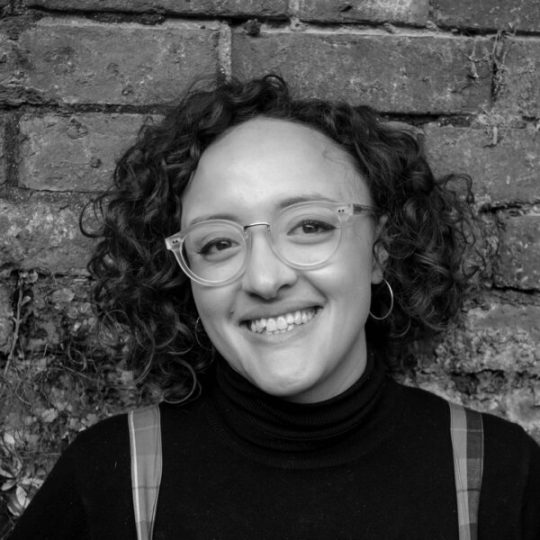

Book of Remembrance at the Musicians' Chapel
I am delighted to announce that after a delay caused by the pandemic two former Chairs of AOTOS are to be commemorated by their names being inscribed in the Book of Remembrance which is held in the Musicians’ Chapel. The Chapel is part of St Sepulchre’s Church (Holborn Viaduct, London, EC1A 2DQ) and was established following the death of Sir Henry Wood.
In 2019 the Secretary of Friends of the Musicians’ Chapel agreed to the committee considering the names of former Chairs of AOTOS not already listed so that they might be added to the Book, which commemorates many distinguished members of the musical profession. After some research I was able to submit several names for consideration and was pleased to hear that this year’s inscriptions will include Mollie Petrie (1988-89) and Paul Deegan (1989-90; 2006-08). Apart from their periods of leadership both these colleagues made enormous contributions to the development of our Association.
A Service of Thanksgiving will take place at St Sepulchre’s on Wednesday 18 May at 5pm. During the service the names of musicians who are being inscribed will be read out. This annual service is an Anglican Choral Evensong but people of all faiths, or of none, are welcome to attend. Special music is provided by the students of music conservatoires and this year the Chamber Choir of the Royal Birmingham Conservatoire will be singing, directed by Paul Spicer.
If you are able to be there, please contact almoner@aotos.org.uk by 11 May for further information, and I can give the organisers some idea of the numbers for the short reception after the service.
I do hope that some members of AOTOS will be able to attend the service, so that we can meet to remember Mollie and Paul together.
– Margaret Hopes, Almoner
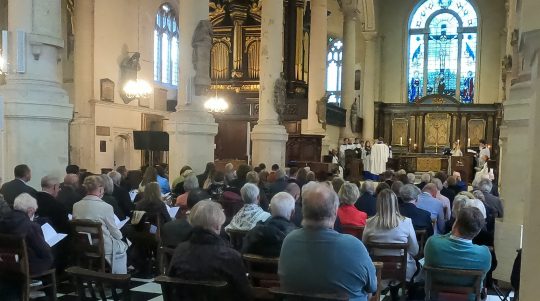
Member of the month: Charlotte Newstead
Who am I?
First things first – everyone knows me as Lotti. As an impressionable teenager I sang Lotti's Crucifixus and decided on the spot to adopt the name. Hence the unusual spelling. I now sing as a concert soprano in the south west, mainly performing oratorio and recital repertoire. I also have a private singing studio in Bristol helping students from 8 to 78 explore and enjoy their voices. The rest of my time is dedicated to helping people from all walks of life widen their musical knowledge through online music appreciation classes.
Music Appreciation
The majority of my singing students are adults who sing for fun. Many are avid concertgoers and sing in choirs themselves, but I realised they often lack background knowledge about the wider repertoire, the way music works and its history that perhaps limits their ability to fully inhabit a song or a particular style. And as we all know, there is never enough time in singing lessons to address this aspect of their musical journey. Having previously delivered music history and theory classes for the adult learning department at the University of Bristol it was a small step for me to begin private classes tailored to this need. I started with one small group 12 years ago, and now have 6 groups. Since Covid, all classes now run on Zoom with people attending from all over the UK and abroad. Between these groups, I cover at least five different works every month.
What sort of music do we cover?
It's entirely a “classical” repertoire, but within that definition, the repertoire is as varied as possible. We rove across all historical periods from Renaissance to the 21st century. There is vocal and choral music and opera of course, but also chamber music, symphonies, ballet, piano solo and organ works. Over time, each group is building a rounded and ever-bigger understanding of the different genres and historical landmarks. I try to provide a good mix of old favourites with lesser-known gems and I strive to promote diversity amongst the composers I select.
What's the format?
All classes take place on Zoom and are led by me. I introduce the music and relevant background information, pointing out useful aural signposts and then we listen to it together. There is ample opportunity for discussion and questions. Discover Classes last 40 minutes and carry the option to catch up via recorded video link for those who prefer to watch in their own time. Explore Classes are 90 minutes.
Who are the classes for?
Anyone who loves music and would like to know more. Attendees are by no means all drawn from my own singing students. Many sing in a choir or play in an orchestra. Several are rather experienced in discussing music. Some are coming to appreciate classical music for the first time.
Different classes have acquired different characteristics. I am happy stretching the boundaries for those who already know a lot as well as reaching out to the nervous newcomer who wants hand-holding as they begin to explore the classical repertoire for the first time. Some are retired and just see it as a nice thing to do one evening a month or on a Saturday morning when their options for going out are more limited. The classes are also ideal for anyone preparing for higher grade exams and auditions where a background understanding of a wide range of music is beneficial. I'm hoping to start a group specifically for people brand new to classical music as soon as I get five minutes!
Where can you find out more?
My website is www.charlottenewstead.co.uk and all the classes can be booked from there. Discounted rates are available to regular subscribers. I'm also really happy to offer a discount to anyone recommended by my colleagues, so please do tell your students and friends to enter AOTOS at the checkout to get 10% off all listed prices.
– Charlotte Newstead
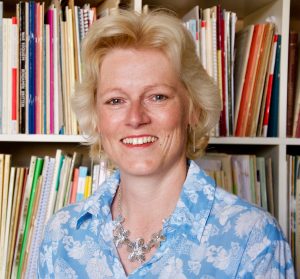
EVTA report by Nicki Kennedy
At the last Council meeting, I was co-opted to a new role within AOTOS, to become the representative of AOTOS with EVTA, the European Voice Teachers’ Association. This strikes me as a perfect moment for organisations like EVTA to help us to connect, not only by attending conferences in-person, such as this summer’s exciting ICVT conference in Vienna, but also to make friends and connections with fellow members using online platforms like Zoom.
Membership of AOTOS means you automatically become a member of this umbrella organisation representing 23 European member associations. EVTA seeks to broaden connections and community across Europe, exploring vocal pedagogy, research, and all things singing.
I take over this role from Janice Thompson, the acting representative since the very sad and untimely passing of Paul Deegan, who was a passionate representative, and I relish the prospect of working on furthering these international links.
Susan Yarnall Monks, (Chair of EVTA), Ed Pitt-Mansfield, Janice Thompson and I met to discuss how EVTA and AOTOS can continue with the work of the past... Susan paid tribute to Paul Deegan, who she says was instrumental in getting the EVTA constitution off the ground again in 2004, and making it correct and understandable in both German (the language and home of EVTA) and English. She said: 'We welcome Nicki as the newly co-opted EVTA/International representative for EVTA and Ed as the Chair Elect, who we look forward to meeting in Vienna at our Council before ICVT. Thank you all for your enthusiasm, all the hard work of Janice in keeping the 'show on the road' when we lost Paul. I shall report back to the EVTA board with a big smile on my face!'
Janice Thompson commented:
‘I have been proud to serve AOTOS as Acting EVTA representative since the untimely departure of our dear Paul Deegan in the early stages of the Covid pandemic. Today we held an exciting introductory meeting to introduce Nicki Kennedy, our newly co-opted EVTA Representative, to members of the EVTA Board. Nicki is a multi-linguist with international musical connections and I know she will do a fantastic job in furthering the links between AOTOS and EVTA. Thank you Nicki, I feel I can stand down knowing that the role is in experienced and capable hands!
Edwin Pitt Mansfield commented:
'I am really looking forward to working with EVTA during my period as Chair and strengthening the relationship between the two associations. I am delighted that we have such an energetic new EVTA rep in Nicki Kennedy and very much look forward to meeting Susan Yarnall Monks and other representatives at the EVTA council meeting in August'.
We are also pleased to share the first edition of a brand new project, EVTA Echo, a collection of articles selected from some of EVTA member associations’ magazines, translated into English so that they can be more widely read. Click here to read EVTA Echo 1 - April 2022.

